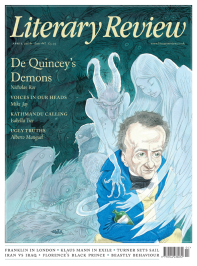Nigel Andrew
Making a Scene
Landskipping: Painters, Ploughmen and Places
By Anna Pavord
Bloomsbury 272pp £20
Rain: Four Walks in English Weather
By Melissa Harrison
Faber & Faber/The National Trust 104pp £12.99
‘Pray have you Rocks and Waterfalls?/For I am as fond of Landskip as ever,’ wrote Thomas Gainsborough from Bath in 1768 to a friend in Derbyshire. Anna Pavord takes his eccentric usage ‘landskip’ and makes a verb of it, coming up with the perfect title for a book that skips enjoyably across the British landscape, its history and the ways in which we have seen and responded to it. But this is no superficial skip: Pavord (best known for her hugely successful The Tulip) writes thoughtfully, with deep and wide-ranging knowledge, of the land and what grows on it, of art, literature and the history of taste. And she writes from the heart – the heart of a countrywoman as well as a country-lover.
This deeply personal book begins (and ends) with the landscapes of Pavord’s Welsh childhood and her beloved Dorset home. The first of its three parts traces the responses of painters and aesthetic tourists to the Lake District, the Scottish Highlands and Snowdonia. Early visitors to the Lakes, we learn, turned their backs on the actual view in order to see it in a ‘Claude glass’, a small tinted mirror designed to give a landscape the look of a painting. Before the Romantics, unmediated nature simply wouldn’t do – especially for the absurd but influential William Gilpin, who toured the country in search of the picturesque and was continually disappointed by nature’s failure to live up to his standards.
Although this section is essentially historical, Pavord is never far away, at one point giving a hilariously grim account of rain-lashed walks in north Norfolk – very flat Norfolk, and very much not her kind of country. Most of us have a particular landscape that feels like home, and Pavord’s

Sign Up to our newsletter
Receive free articles, highlights from the archive, news, details of prizes, and much more.@Lit_Review
Follow Literary Review on Twitter
Twitter Feed
Margaret Atwood has become a cultural weathervane, blamed for predicting dystopia and celebrated for resisting it. Yet her ‘memoir of sorts’ reveals a more complicated, playful figure.
@sophieolive introduces us to a young Peggy.
Sophie Oliver - Ms Fixit’s Characteristics
Sophie Oliver: Ms Fixit’s Characteristics - Book of Lives: A Memoir of Sorts by Margaret Atwood
literaryreview.co.uk
For a writer so ubiquitous, George Orwell remains curiously elusive. His voice is lost, his image scarce; all that survives is the prose, and the interpretations built upon it.
@Dorianlynskey wonders what is to be done.
Dorian Lynskey - Doublethink & Doubt
Dorian Lynskey: Doublethink & Doubt - Orwell: 2+2=5 by Raoul Peck (dir); George Orwell: Life and Legacy by Robert Colls
literaryreview.co.uk
The court of Henry VIII is easy to envision thanks to Hans Holbein the Younger’s portraits: the bearded king, Anne of Cleves in red and gold, Thomas Cromwell demure in black.
Peter Marshall paints a picture of the artist himself.
Peter Marshall - Varnish & Virtue
Peter Marshall: Varnish & Virtue - Holbein: Renaissance Master by Elizabeth Goldring
literaryreview.co.uk